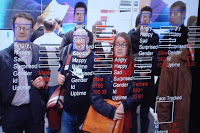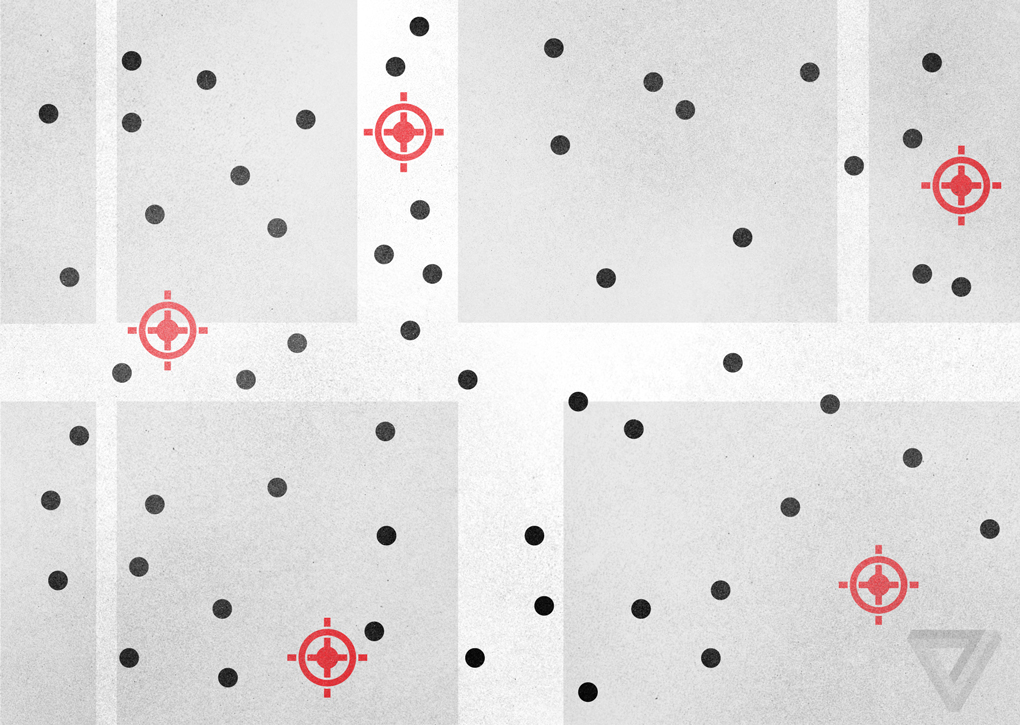As we look around at the Police State being built across the world, combined with enhanced mind control techniques, it is easy to draw direct parallels with books like 1984 and Brave New World. It’s almost as if these books formed a clear blueprint for anyone seeking control over large populations.
With the quickening pace of technological advancement it is no surprise to see “ideas” become reality quicker than ever before. Philip K. Dick explored the concept of pre-crime in his short story “The Minority Report” in 1956, but it wasn’t until Steven Spielberg offered it on the big screen as Minority Report in 2002 that the audience got a true look at a potential day-to-day existence under corporate and government data management and control.
We are now at the point where “Minority Report” is being used as a sound description of current technological applications, even in mainstream news, which means that the future is actually the present. Below you will find 10 signs that we have now entered the world depicted in fiction.
The latest news from Chicago only adds to this list, as police are moving beyond simply possessing the technology and are now putting it into effect.
Chicago’s “Heat List” is an index of approximately 400 people who have been identified by a computer algorithm as being future threats to commit violent crime. Without having actually committed a crime, some of those on the list are beginning to get visits from Chicago police warning them that they are already being watched:
When the Chicago Police Department sent one of its commanders to Robert McDaniel’s home last summer, the 22-year-old high school dropout was surprised. Though he lived in a neighborhood well-known for bloodshed on its streets, he hadn’t committed a crime or interacted with a police officer recently. And he didn’t have a violent criminal record, nor any gun violations. In August, he incredulously told the Chicago Tribune, “I haven’t done nothing that the next kid growing up hadn’t done.” Yet, there stood the female police commander at his front door with a stern message: if you commit any crimes, there will be major consequences. We’re watching you.
Chicago is apparently considering this to be part of “policing in the 21st century.” A report from The Verge explains how Chicago has taken the lead in predictive behavior police tech:
In 2009, the National Institute of Justice (NIJ) made millions of dollars in grants available for any police department with a burgeoning predictive program. Police all over the country applied to tap into those NIJ dollars. The big winner was Chicago; its combination of headline-making homicide rates and already established data- and tech-focused policing made it a perfect fit. The CPD received more than $2 million to test two phases of its experimental program.Though it took awhile to get started in earnest (staff turnover and internal politics in 2011 and 2012 stalled the project), last year the CPD’s predictive program picked up steam. One man behind that progress was Miles Wernick.
Wernick is the Motorola professor and director of the Medical Imaging Research Center at Illinois Institute of Technology (IIT) in Chicago. He says he’s been doing predictive analysis work since the 1980s, when he worked with the US military to recognize potential targets in the battlefield. From there he proceeded to medical imaging. A lot of his current work focuses on analysing data and brain scans to make automated diagnoses of dementias in elderly patients — not exactly police work.
These paragraphs encapsulate two of the major warnings that the alternative media has been shouting for years: namely that military tech always trickles down into local law enforcement; and, secondly, that Big Data initiatives which are heralded by the establishment as solutions in the computing and medical fields have a range of privacy-killing additional applications that affect people far beyond the initially stated reach.
Also highlighted are the same concerns that are cropping up in the area of NSA spying – association is an assumption of tendency toward eventual guilt. Miles Wernick goes on to say:
“It’s not just shooting somebody, or being shot,” he says. “It has to do with the person’s relationships to other violent people.”
This is in line with what Andrew Papachristos, a Yale sociologist and Chicago native, calls a social networking theory. When it comes to violence, Papachristos recently told Chicago Magazine, “It’s not just about your friends and who you’re hanging out with, it’s actually the structure of these networks that matter.”
So while Wernick acknowledges that sometimes people such as Robert McDaniel — who haven’t been convicted of a violent crime — may find themselves in the wrong social networks, their presence on the list is not random.
A commander of the program stated it even more simply:
If you end up on that list, there’s a reason you’re there.
This indicates a fundamental shift in the way policing will be done in the future of America. Until now, we have been reporting on this type of technology and have been forced to speculate about its coming implementation. Well, now there is no doubt. And lest anyone believe that this is just an outcropping of Chicago’s notoriously Police State-happy mentality, Police Commander Jonathan Lewin matter-of-factly states the following:
This [program] will become a national best practice. This will inform police departments around the country and around the world on how best to utilize predictive policing to solve problems. This is about saving lives. [emphasis added]
 Whether or not it will actually save lives is debatable. Has the No-Fly List saved lives? Have any of the other of the many lists one can be added to these days actually saved any lives? These lists are secretive and have become nearly impossible to independently verify as to how someone got on the list, if they deserve to be there; and, if not, how to get off the list … or if the lists are effective.
Whether or not it will actually save lives is debatable. Has the No-Fly List saved lives? Have any of the other of the many lists one can be added to these days actually saved any lives? These lists are secretive and have become nearly impossible to independently verify as to how someone got on the list, if they deserve to be there; and, if not, how to get off the list … or if the lists are effective.
The Verge article linked below highlights the potential racial profiling of such policies – and indeed this has happened in the case of New York’s own low-tech Stop-and-Frisk policy.
So the verdict is out on saving lives. But one thing is for certain: the arrival of the high-tech Police State is certainly not about saving freedom, nor is it about preserving a Constitution designed to protect us from a Minority Report society.
Source:
http://www.theverge.com/2014/2/19/5419854/the-minority-report-this-computer-predicts-crime-but-is-it-racist
____________________________________________________________________________
10 Signs We Live In a “Minority Report” World
Individual pieces of news often get lost or forgotten rather easily in today’s fast-paced news cycle, so let’s look at an aggregate of 10 mainstream news items that offer a comprehensive picture of where we are and where we are likely to be headed both from a government surveillance standpoint, as well as targeted advertising.
 |
| image source |
1. They’re watching … Japanese electronics company NEC develops ‘Minority Report’ style billboard, The Telegraph, 3/10/2010: “Engineers have developed the billboard, similar to one used in the Tom Cruise blockbuster, that uses built in cameras to instantly identify a shopper’s age and gender as they walk past. The facial-recognition system, called the Next Generation Digital Signage Solution, then offers consumers a product it thinks is suited to their demographic.”
2. Microsoft Kinect Learns to Read Hand Gestures, Minority Report-Style Interface Now Possible, IEEE Spectrum, 3/10/2013:
3. The Long Eye of the Law: So Who’s Ready for a ‘Minority Report’-Style Future? Motherboard, 3/20/2013: On Monday, Japanese tech developers Fujitsu announced they had created . . . a bit of technology that can measure a person’s pulse using a camera or a computer webcam, just by analyzing that person’s face . . . It’s Minority Report-style technology, to be sure—another in a burgeoning list of tech-driven ways police could prevent crimes before they happen.”
*Also see New York’s Domain Awareness System helped along by Microsoft.
How to Disappear Off the Grid Completely (Ad)
4. Minority Report moves step closer as Lord Sugar launches face recognition adverts, The Telegraph, 7/9/2013: “The media company has launched OptimEyes, which will be used in more than 6,000 of its screens to target over 50m people in the UK, Germany, Poland, Switzerland, UAE, Oman, Kenya, Angola and South Africa. However, the majority of the screens, some 3,561, are in the UK in doctors’ surgeries, hospitals, convenience stores, petrol forecourts, Halifax banks, airports and train stations . . . The product comes less than a week after Sky Deutschland revealed it has developed technology to transfer adverts from train windows directly and silently into commuters’ heads.
5. Brain scans of inmates could lead to ‘Minority Report’ style ability to predict if they will re-offend, The Daily Mail, 7/15/2013: “Groundbreaking new research could allow scientists to predict if prisoners will re-offend – potentially condemning those convicted of serious crimes to a lifetime behind bars . . . It could also be used to the benefit of society in using brain imaging in deciding parole.”
 6. Gesture Through News Minority Report-Style With New York Times’ Leap Motion App, Fast Company, 7/18/2013: Rather than having to flick through headlines on a touch-screen device or scroll through articles using a mouse — how antiquated! — the company’s new app allows readers to navigate through stories by motioning their hands in mid-air, with Leap Motion sensors interpreting the signals . . . The New York Times has also suggested it will give the company an opportunity to implement new advertising capabilities ‘that [will] allow brands to connect with readers using motion-controlled ad units.'”
6. Gesture Through News Minority Report-Style With New York Times’ Leap Motion App, Fast Company, 7/18/2013: Rather than having to flick through headlines on a touch-screen device or scroll through articles using a mouse — how antiquated! — the company’s new app allows readers to navigate through stories by motioning their hands in mid-air, with Leap Motion sensors interpreting the signals . . . The New York Times has also suggested it will give the company an opportunity to implement new advertising capabilities ‘that [will] allow brands to connect with readers using motion-controlled ad units.'”
7. Minority Report finally becomes a reality: new hi-tech video wall will let law enforcement agencies sift through data with a wave of their hand, The Daily Mail, 7/23/2013: “The hi-tech computer system behind the film Minority Report – where Tom Cruise speeds through video on a large screen using only hand gestures – is making its way into the real world. American computer experts have revealed the software has become a reality – and they hope to sell it to law enforcement agencies around the world. The interface developed by scientist John Underkoffler has been commercialized by the Los Angeles firm Oblong Industries as a way to sift through massive amounts of video and other data.”
*Also see this report on Big Data and pre-crime software.
8. Control Google Earth with Minority Report-style gestures, via Leap Motion, TNooz, 8/5/2013:
9. Minority Report-style Advertising Coming to NYC, 247Sports, 8/8/2013: “Recycling bins data mine your smartphone when you are in proximity to tailor ads when you walk by the screen and stuff. Already in London, looking to expand to NYC and other World cities soon.”
10. Google Submits Patent For Minority Report Style Eye Tracking Device, Prison Planet, 8/15/2013: “The patent filing describes a “head mounted device”, for example hi-tech glasses, that would have the ability to track eye movement, effectively monitoring reactions to external stimuli, including changes in emotion.” From The Verge: “Google could be betting that advertisers will pay to know whether consumers are actually looking at their billboards, magazine spreads, and online ads.”
From the patent application, which was filed in May 2011:
Pay per gaze advertising need not be limited to on-line advertisements, but rather can be extended to conventional advertisement media including billboards, magazines, newspapers, and other forms of conventional print media. Thus, the gaze tracking system described herein offers a mechanism to track and bill offline advertisements in the manner similar to popular online advertisement schemes.
***********
 The ways that we are tracked, traced, and databased are increasing every day. Some of it is arriving without our agreement and is being utilized by private corporations and governments without our explicit approval, as the recent revelations of data spying have exposed. If we have learned one thing it is that information is knowledge and knowledge is power. The power of data collection in the hands of those who wish to exert more control is not likely to halt. And all indications show that it is not enough to have logged and charted where we have been; the surveillance state wants to know where we are going.
The ways that we are tracked, traced, and databased are increasing every day. Some of it is arriving without our agreement and is being utilized by private corporations and governments without our explicit approval, as the recent revelations of data spying have exposed. If we have learned one thing it is that information is knowledge and knowledge is power. The power of data collection in the hands of those who wish to exert more control is not likely to halt. And all indications show that it is not enough to have logged and charted where we have been; the surveillance state wants to know where we are going.
Our Orwellian world is beginning to look nostalgic compared to what is in production. Neuroscientists in 2010 stated that they know you better than you know yourself. Meanwhile, it is being estimated that computers know to a 93% accuracy where you will be, before you make your first move. The recent major global funding of neuroscience and narrative control indicates that the final target is the human brain and every thought that resides there.
However, we ought to be aware that much of our data is willingly being given via social media and the gadgets we choose to buy. As technology continues to march forward at an exponential rate, we might do well to consider how much of this we are comfortable buying into. And if we must, should we be seeking ways to subvert the information stream?
Recently From Nicholas West:
- “Taranis” Stealth Bomber Keeps England In The Drone Arms Race
- Economic Elite Announce Plan to Replace Human Labor with Machines
- Nanobiometrics Will Track You By Smell
Updated 5/26/2016


I am very interested in your story and where you are with this process now. I’m a reporter looking into the heat list and I’m trying to find individuals to talk to. Please contact me if you’d be interested in talking, or if you know someone else on the heat list who would be willing to share their story. Thank you. nicolemcgee2015@u.northwestern.edu
Do not put links to amazon since such entreprises are taking great part in the transformation of the world in a huge police state, and does not respect the rights of neither fairly pays her workers. amazon should be boycotted not advertised for. 1984 is as long as I know, public domain and can be downloaded for free
Sorry, try again.